 I didn't want to say anything about this last week, given the hard fought and well won victory of Net Neutrality proponents. They worked hard and long and smartly and organized very well and deserved at least a few days of victory laps for the effort.
I didn't want to say anything about this last week, given the hard fought and well won victory of Net Neutrality proponents. They worked hard and long and smartly and organized very well and deserved at least a few days of victory laps for the effort.
Indeed, as noted in attorney Ernie Canning's piece here Thursday, describing the legal contours and challenges the FCC's new ruling attempts to circumnavigate: "The new policy is unquestionably a victory for both the idea of Internet freedom, as well as for the unprecedented campaign waged by the public to advocate in favor of 'Net Neutrality' over the past several years. An outspoken public won the day, for a change, against very powerful interests. It was a victory that, particularly over previous years, seemed to be anything but assured."
So this thought is not meant to diminish the accomplishment of the army of Davids' who defied the odds and managed to defeat an army of Goliaths in a way that was virtually unthinkable even a year ago.
That said...
The battle for Net Neutrality, while praiseworthy and important, always seemed to me to be the lowest hanging fruit for proponents of free and open speech, reporting and public debate. In other words, we've always had Net Neutrality from the beginning of the Internet. The fight finally won last week was simply about keeping it that way.
On the other hand, the FCC oversees --- or, at least, is supposed to --- another area of enormous importance to an informed electorate and to free and open speech: our public airwaves.
The battle to retake the airwaves from a tiny handful of near-monopolistic corporate entities which have long overtaken them, has taken a distant second place (at best) to the battle for Net Neutrality over the years. That, even as the FCC is still required by law to assure those entities exercise their use of broadcast licenses "to operate in the public interest and to afford reasonable opportunity for the discussion of conflicting views of issues of public importance".
Nonetheless, the influence of our public airwaves on our political discourse is arguably as great as its ever been in this country. At least in modern times. As media expert Sue Wilson has painstakingly documented over the years on the pages of The BRAD BLOG, talk radio listenership --- and the influence of its corporate-backed voices --- remains huge.
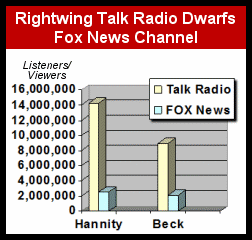 By way of comparison, as the 2011 chart at right illustrates, while progressives tend to cite Fox "News" as the root of much of our country's disinformed evils, they're not even the half of it. While Glenn Beck, during his heyday on Fox "News", garnered 2 million viewers per afternoon, he still had a radio audience of more than 10 million each morning. The same remains true for Fox' Sean Hannity today, as millions absorb the blatant lies and dishonesty of such talkers --- over our free public airwaves --- as they go to and from work each day.
By way of comparison, as the 2011 chart at right illustrates, while progressives tend to cite Fox "News" as the root of much of our country's disinformed evils, they're not even the half of it. While Glenn Beck, during his heyday on Fox "News", garnered 2 million viewers per afternoon, he still had a radio audience of more than 10 million each morning. The same remains true for Fox' Sean Hannity today, as millions absorb the blatant lies and dishonesty of such talkers --- over our free public airwaves --- as they go to and from work each day.
Rush Limbaugh's listenership, in the meantime, still dwarfs the number of viewers during all of the prime time hours combined each night on Fox "News". And those are just a few of the foot soldiers in the army of rightwing, corporatist voices which now enjoy a virtual stranglehold on those public airwaves.
When one wonders where an entire swath of the nation comes to take on faith completely debunked nonsense such as "death panels in Obamacare", "global warming is a hoax", "Saddam has weapons of mass destruction", while the same nonsense is often sold and cited on Fox "News", it's the unceasing repetition of bullshit as "fact" reverberating across our publicly-owned, but corporately-controlled radio dial that hammers the case home every day for tens of millions of Americans. No matter how ridiculous and easily shown to be false those arguments may be, they are drilled into the brains of Americans hour after hour, day after day and year after year on the freely available airwaves.
And yet, progressives seem to have all but abandoned the fight to force the FCC to do its job and restore fairness or balance in the public interest to the radio waves, while choosing instead to see the Internet as the Future and the public airwaves as a relic of the Past.
They may be right. The public airwaves, at some time in the not-so-distant future, may become completely irrelevant to public discourse and education of the electorate. But, for now at least, that remains anything but the case, no matter how much progressive warriors for Net Neutrality might choose to see it that way.
I pressed Timothy Karr of FreePress.net, a long-time leader in the fight for Net Neutrality, about that issue some years ago while I was guest hosting the Mike Malloy Show. He disputed my assertion that media reformers had abandoned the fight for the public airwaves.
"We have not backed off this issue one inch," he said. He felt a restoration of the Fairness Doctrine which Ronald Reagan dissolved in 1987, however, was not the answer to the problem. He argued that any such government mandate requiring any sort of balance over our public airwaves in regard to controversial issues would be met with successful First Amendment challenges.
Instead, he averred, the answer was in forcing diversity of ownership for radio and TV licensees.
"We are strong believers that in order to create a more accountable, diverse and democratic media system, you have to break up some of the ownership structures that have been put in place over the last 20 years --- basically since the 1996 Telecommunications Act --- that allowed for companies like Clear Channel to consolidate control over 1,200 radio stations."
Following Reagan's dissolution of the long-standing Fairness Doctrine, Karr explained, the "1996 Telecommunications Act sort of kicked out the stops to the consolidation of the industry that we've seen, and that gave rise to the Michael Savages and the Rush Limbaughs and the Sean Hannitys."
"So the work that we're doing right now is to try to find other ways that we can break up ownership structure to limit the amount of radio stations that a single company can control in a certain area, to make sure that there are protections in place that allow for more diversity in ownership."
He noted, at the time, that "minorities make up about 33% of our population...and yet they own only about 5% of our radio and television broadcast licenses." Unfortunately, those ownership numbers have changed very little since my conversation with Karr several years ago.
Indeed, as The BRAD BLOG reported on January 21st, 2009, on the day that Barack Obama was first inaugurated, his then new White House website promised on its "Technology" Page to take action to "Encourage diversity in the ownership of broadcast media...and clarify the public interest obligations of broadcasters who occupy the nation's spectrum."
The statement offered a bit of hope at the time. Yet, by summer of the same year, as I reported at Alternet, that paragraph had been quietly excised from the White House website entirely. The nascent effort seems to have been largely abandoned by both the White House and supposed media reformers in the ensuing years.
"The FCC needs to break up local monopolies," Karr asserted during my radio interview with him in 2010. They need to "set ownership caps on the number of stations that one company can own and also create allowances on the airwaves for diversity of ownership, so that you'll see, rather than five to six companies owning most of the radio and broadcast televisions stations in the country, you'll see hundreds and hundreds of them."
He pointed us, at the time, to Free Press' campaign on media ownership at StopBigMedia.com, where the group continues to draw attention to large corporate media mergers. Unfortunately, the effort seems to have borne little fruit in establishing diversity of any sort on our public airwaves in the meantime. In fact, the problem seems only to have gotten worse since then, as Clear Channel and other licensees of virtually all of our public broadcast frequencies have removed anything but rightwing talk radio from the political spectrum heard over the air.
"This is the big enchilada. This is what's killing us. The fact that the people no longer own the people's airwaves, and in fact they are being lied to over those airwaves," I responded to Karr at the time. "And we're spending a lot of time fighting the necessary fight for Net Neutrality, but it really is, I hate to say it, low hanging fruit, when the big enchilada is taking back our airwaves."
In her 2009 documentary, Broadcast Blues, media maven Wilson used these charts to highlight the radical imbalance of political talk over our public airwaves at the time...
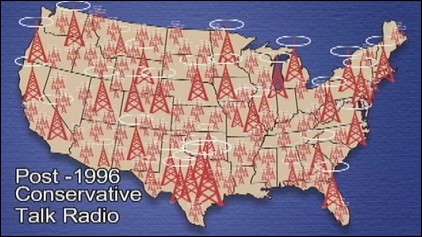
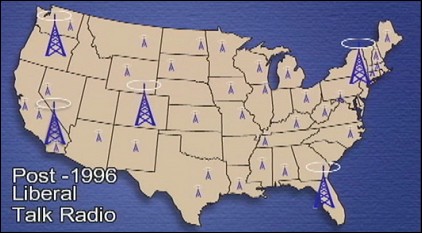
Since the maps above were created, back when 95% of the country could hear Rightwing corporatist talk radio for free over our publicly-owned airwaves, but less than 10% could hear alternative political points of view, the situation has quietly become far worse. Almost all of the commercial progressive stations represented on the second map above have since been replaced with other types of programming.
Clear Channel owned stations such as KPOJ in Portland, Green960 in San Francisco, KTLK in Los Angeles and CBS-owned KPTK in Seattle have all flipped from progressive talk to rightwing talk or other formats in the ensuing years, leaving listeners in those very progressive pockets of the nation, not to mention everywhere else, without free radio access to viewpoints that counter the ubiquitous corporatist narrative.
"If more than just six 'persons' were in charge of radio, as is now the case," Wilson wrote for The BRAD BLOG in 2011, snarkily underscoring the absurdity of "corporate personhood" in her remarks, "we would naturally get more diversity of political thought, more debate over real issues, and more localism, which once was the hallmark of terrestrial radio."
The battle for Net Neutrality --- one that this site has joined since at least 2007 --- was never easy, nor its happy outcome certain. Its importance should, by now, be self-evident to all but those who have been disinformed about it --- ironically enough --- over our public airwaves. But the fight to claw back those very airwaves from corporate interests which fail to use them in the "public interest" has always been a much more difficult fight. It is a fight, however, that should never have been side-tracked and/or abandoned. And now, with the battle for Net Neutrality largely won (save for the inevitable political and legal battles that will be launched in an attempt to undermine it), perhaps proponents of free and open speech can turn some more of their energies back to the fight for our public airwaves.
As I've noted many times over the years, the public airwaves are a very limited entity, a scarce resource, and, thus, their use in the public interest has long ago been determined, by law and the courts, to be an issue of national importance. The government should be protecting those limited resources with the same vigor it protects the limited resources of our National Park system. Free speech proponents must demand no less. Now, perhaps, they'll have a bit more time to do so.


 Sunday 'Total Obliteration' Toons
Sunday 'Total Obliteration' Toons Thank You For Your Attention to This Matter:
Thank You For Your Attention to This Matter: 'Green News Report' 6/26/25
'Green News Report' 6/26/25
 Mamdani Primary 'Win' Augurs New Generation of Progressives Rising: 'BradCast' 6/25/25
Mamdani Primary 'Win' Augurs New Generation of Progressives Rising: 'BradCast' 6/25/25 U.S. Authoritarianism Under-way (But We're Still Here to Fight It): 'BradCast' 6/24/25
U.S. Authoritarianism Under-way (But We're Still Here to Fight It): 'BradCast' 6/24/25 'Green News Report' 6/24/25
'Green News Report' 6/24/25 'Anti-War' Trump Attacks a Mid-East Nation on False Claims About WMD: 'BradCast' 6/23/25
'Anti-War' Trump Attacks a Mid-East Nation on False Claims About WMD: 'BradCast' 6/23/25  Sunday 'Peacemaker' Toons
Sunday 'Peacemaker' Toons Senate Health Care Cuts 'More Extreme' Than House Version: 'BradCast' 6/19/25
Senate Health Care Cuts 'More Extreme' Than House Version: 'BradCast' 6/19/25 'Green News Report' 6/19/25
'Green News Report' 6/19/25 What 'Anti-War President'? MAGA Civil War Over Trump, Iran: 'BradCast' 6/18/25
What 'Anti-War President'? MAGA Civil War Over Trump, Iran: 'BradCast' 6/18/25 Trump Calls for 'Remigration', a Codeword for 'Ethnic Cleansing': 'BradCast' 6/17/25
Trump Calls for 'Remigration', a Codeword for 'Ethnic Cleansing': 'BradCast' 6/17/25 'Green News Report' 6/17/25
'Green News Report' 6/17/25 Last Weekend Today: 'BradCast' 6/16/25
Last Weekend Today: 'BradCast' 6/16/25 Sunday 'Despot Times, Despot Measures' Toons
Sunday 'Despot Times, Despot Measures' Toons Then They Came for the U.S. Senators: 'BradCast' 6/12/25
Then They Came for the U.S. Senators: 'BradCast' 6/12/25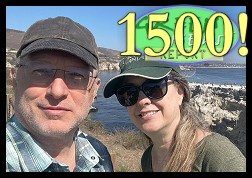 'Green News Report' 6/12/25
'Green News Report' 6/12/25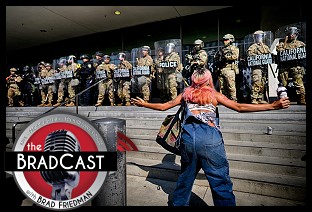 Lawless Trump Warms Up for Insurrection Act: 'BradCast' 6/11/25
Lawless Trump Warms Up for Insurrection Act: 'BradCast' 6/11/25 Trump Inciting Violence, State of Fear in L.A., Elsewhere: 'BradCast' 6/10/25
Trump Inciting Violence, State of Fear in L.A., Elsewhere: 'BradCast' 6/10/25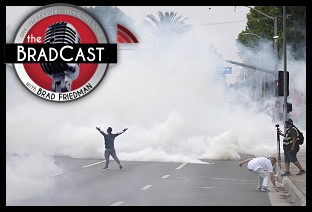 Nevermind Elon and Epstein Files, Trump Declares L.A. 'Riots'!: 'BradCast' 6/9/25
Nevermind Elon and Epstein Files, Trump Declares L.A. 'Riots'!: 'BradCast' 6/9/25 'Jesus Weeps' at Trump's
'Jesus Weeps' at Trump's 300k 'Preventable' Deaths Since Trump USAID Shutdown: 'BradCast' 6/4/25
300k 'Preventable' Deaths Since Trump USAID Shutdown: 'BradCast' 6/4/25 Storm Warnings: 'BradCast' 6/3/25
Storm Warnings: 'BradCast' 6/3/25 SCOTUS Ignores Own Precedents In Recent 'Emergency' Rulings: 'BradCast' 6/2/25
SCOTUS Ignores Own Precedents In Recent 'Emergency' Rulings: 'BradCast' 6/2/25 'A World of Tyrants, Bribes, and Influence': 'BradCast' 5/22/25
'A World of Tyrants, Bribes, and Influence': 'BradCast' 5/22/25
 VA GOP VOTER REG FRAUDSTER OFF HOOK
VA GOP VOTER REG FRAUDSTER OFF HOOK Criminal GOP Voter Registration Fraud Probe Expanding in VA
Criminal GOP Voter Registration Fraud Probe Expanding in VA DOJ PROBE SOUGHT AFTER VA ARREST
DOJ PROBE SOUGHT AFTER VA ARREST Arrest in VA: GOP Voter Reg Scandal Widens
Arrest in VA: GOP Voter Reg Scandal Widens ALL TOGETHER: ROVE, SPROUL, KOCHS, RNC
ALL TOGETHER: ROVE, SPROUL, KOCHS, RNC LATimes: RNC's 'Fired' Sproul Working for Repubs in 'as Many as 30 States'
LATimes: RNC's 'Fired' Sproul Working for Repubs in 'as Many as 30 States' 'Fired' Sproul Group 'Cloned', Still Working for Republicans in At Least 10 States
'Fired' Sproul Group 'Cloned', Still Working for Republicans in At Least 10 States FINALLY: FOX ON GOP REG FRAUD SCANDAL
FINALLY: FOX ON GOP REG FRAUD SCANDAL COLORADO FOLLOWS FLORIDA WITH GOP CRIMINAL INVESTIGATION
COLORADO FOLLOWS FLORIDA WITH GOP CRIMINAL INVESTIGATION CRIMINAL PROBE LAUNCHED INTO GOP VOTER REGISTRATION FRAUD SCANDAL IN FL
CRIMINAL PROBE LAUNCHED INTO GOP VOTER REGISTRATION FRAUD SCANDAL IN FL Brad Breaks PA Photo ID & GOP Registration Fraud Scandal News on Hartmann TV
Brad Breaks PA Photo ID & GOP Registration Fraud Scandal News on Hartmann TV  CAUGHT ON TAPE: COORDINATED NATIONWIDE GOP VOTER REG SCAM
CAUGHT ON TAPE: COORDINATED NATIONWIDE GOP VOTER REG SCAM CRIMINAL ELECTION FRAUD COMPLAINT FILED AGAINST GOP 'FRAUD' FIRM
CRIMINAL ELECTION FRAUD COMPLAINT FILED AGAINST GOP 'FRAUD' FIRM RICK SCOTT GETS ROLLED IN GOP REGISTRATION FRAUD SCANDAL
RICK SCOTT GETS ROLLED IN GOP REGISTRATION FRAUD SCANDAL VIDEO: Brad Breaks GOP Reg Fraud Scandal on Hartmann TV
VIDEO: Brad Breaks GOP Reg Fraud Scandal on Hartmann TV RNC FIRES NATIONAL VOTER REGISTRATION FIRM FOR FRAUD
RNC FIRES NATIONAL VOTER REGISTRATION FIRM FOR FRAUD EXCLUSIVE: Intvw w/ FL Official Who First Discovered GOP Reg Fraud
EXCLUSIVE: Intvw w/ FL Official Who First Discovered GOP Reg Fraud GOP REGISTRATION FRAUD FOUND IN FL
GOP REGISTRATION FRAUD FOUND IN FL

































